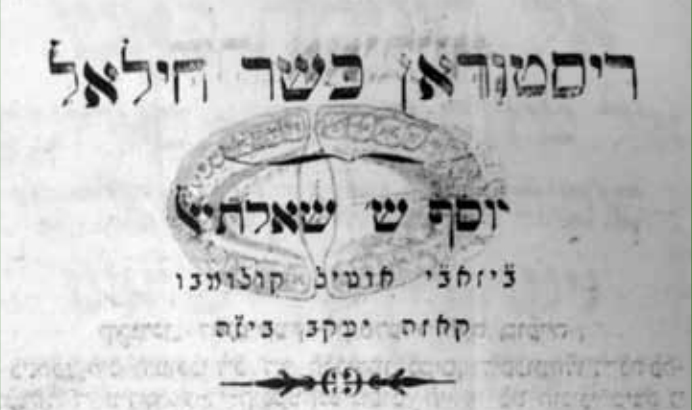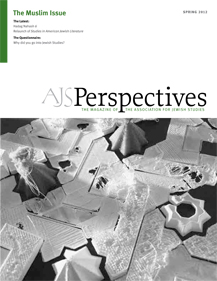
As surprising as such assertions and alliances may appear to us from the vantage point of the early twenty-first century, in the context of nineteenth-century political, economic, and social configurations, they were far from inscrutable. If we presume the claims of the piece to be true, Warsaw's Muslims likely ate kosher meat because it was the closest thing they could get to halal meat in a city with a negligible Muslim community. Similar arrangements were recorded in other contexts in the nineteenth century, from Ottoman Syria to Peabody, Massachusetts, where a sizeable Ottoman émigré community settled. An advertisement placed in a Ladino publication of Salonica in the early twentieth century even advertised a "Kosher Halal" restaurant, suggesting that such arrangements could be formalized and turned into a profitable economic venture.
Seen in this light, it is not entirely surprising that the Muslim "Turks" of late nineteenth- century Warsaw would have seen fit to acquire a kosher certificate: by doing so they opened their business to the city's substantial Jewish population. Moreover, throughout the nineteenth-century Middle East, it was not uncommon for Jews and Muslims to emphasize their shared practice of male circumcision in order to mark themselves off from Christians who were often referred to as "the uncircumcised" in such discussions. What is intriguing about the announcement of Warsaw's Muslim bakers is that its authors turned what was no doubt a makeshift arrangement into a virtue. Realizing that—besides Jews—only Muslims would make a point to eat kosher meat exclusively (at least where halal meat was unavailable), Warsaw's Muslim bakers employed Jews' and Muslims' similar dietary habits to help prove what they were not— namely Christian. By drawing attention to customs Muslims and Jews shared, their appeal also aimed to reinforce Jewish- Muslim economic ties in a local context.
Yet the same announcement made broader political declarations as well. Expressing their sympathy for the Jewish victims of Greek accusations and violence on the island of Corfu, the Muslim bakers of Warsaw took their message of Jewish-Muslim allegiance one step further. Not only did they propose that Muslims never supported blood libel accusations against the Jews, they also suggested that the Ottoman sultan—their august sovereign—received the Jewish refugees fleeing Corfu, offering them land on which to settle. Having entered the tangle of a local Jewish boycott, spurred in turn by a foreign event, the announcement of a small group of Muslim bakers of Ottoman origin in Warsaw thus made claims about the worldwide alliance of Muslims and Jews.
Although the notice first appeared in the Hebrew press of Warsaw itself, it did not take long for it to find its way to Istanbul, where Sephardi audiences of the Ottoman capital and beyond no doubt read the story of a faraway Jewish boycott of Greek Christians and of the Warsaw Jews' allies, the Muslim Turks, subjects of a sultan who was also a friend to the Jews. Indeed, a more telling story could not have been invented for late Ottoman Sephardi elites interested in forging close ties with their state and with their Muslim neighbors in the empire, whom they (rightly) understood to be the hegemonic group in imperial politics. Though it had been introduced merely as a "curious report," the piece must have resonated on multiple levels with the Ladino readers who encountered it in their own imperial context. After all, the Muslim bakers it described were their compatriots, and the sultan they invoked was also their sultan.
By 1891, when the report appeared in the pages of Istanbul's Ladino press, Jewish communal leaders had been engaged for decades in the project of turning their coreligionists in the empire into imperial citizens, teaching them to consider their neighbors as "brothers" and their empire as a sacred homeland. They had originally done so in response to nineteenth-century state reforms in the empire, which granted equality to non-Muslims and introduced new, universal definitions of Ottoman belonging. By the late nineteenth century, however, such universal definitions competed with new approaches to imperial politics that focused increasingly on the Islamic nature of the Ottoman state. Many Ottoman Jews responded to the politicization of Islam in the empire with claims about the inherent compatibility of Islamic and Jewish customs in a way not dissimilar to the language that appeared in the announcement of the Muslim bakers of Warsaw. Ottoman Jews also participated in public discussions that drew upon Islamic concepts like jihad, or holy war, such as when the Ladino press of the empire praised the empire's Muslim martyrs who fell for the cause of "their state and religion" in wars fought against different Christian countries.
Ottoman Jews' public pronouncements about their relationship with their state in the late nineteenth century also offered an image of their empire as a refuge for persecuted Jews, just as the announcement of the Turkish bakers of Warsaw had done. In fact, just a month after the bakers' note appeared in the Ladino press of Istanbul, a Sephardi journalist of Izmir proposed that Ottoman Jews create a new holiday commemorating the 400th anniversary of their arrival in the empire as a means of demonstrating Jews' gratitude to their state and sultan. The holiday they invented the following year harked back to the distant past when the Jews' "brother Ishmael" took them in, just as Christian Europe expelled them, suggesting in the process that Muslim-Jewish alliances were based on a centuries-long arrangement. In this case, as with the Warsaw bakers' announcement, the ties Jews forged with Muslims were almost always developed against the foil of a shared opponent, usually a Christian one. Muslim-Jewish cooperation was invariably part of a triangular relationship, in other words, and thus regularly entailed not only positive relations but also carefully nurtured exclusions. This pattern emerged clearly when Jews and Muslims together boycotted Greek Orthodox businesses in the empire after Crete declared its union with Greece in 1909. As they did so, they combined assertions about their social and political affinities with an expression of their shared economic interests, just as the Muslims of Warsaw had called upon Jews to do two decades earlier.
Late Ottoman Muslim-Jewish alliances were hardly uncomplicated. They were not guaranteed to work, nor were they the only options available to Ottoman Jewish or Muslim subjects, who sometimes pursued alternative strategies of allegiance. To be clear, I do not mean to issue a call to return to an idealized past: the solidarities Muslims and Jews expressed in various contexts and moments throughout the nineteenth and twentieth century were often based on their perception of shared interests, even when they spoke about the inherent kinship of their communities. What is more, such alliances almost always involved the exclusion of other groups. Yet the prevalence of Jewish- Muslim collaboration in a not-so-distant past should nonetheless serve as a reminder of the historically contingent—and thus potentially fleeting—nature of political partnerships and social arrangements.
Indeed, it may be difficult for most people today to picture Jews and Muslims participating collectively in a boycott against Christians, to imagine Muslims declaring publicly that they eat nothing but kosher meat, or to understand a world in which Jews would participate in discussions of a jihad against a Christian power. Although the myriad individuals who spoke of Muslim-Jewish bonds of brotherhood gave the impression that such relationships were both timeless and self-evident, they now reach us as little more than a "curious report" from a distant past. Ultimately, even those political alliances and social coalitions that appear at particular historical junctures to be obvious and immutable are prone to the amnesia of later generations and new political alignments.


 Julia Phillips Cohen is an assistant professor in the Program in Jewish Studies and the Department of History at Vanderbilt University. She is the author of Becoming Ottomans: Sephardi Jews and Imperial Citizenship in the Modern Era (New York: Oxford University Press, 2014), and, together with Sarah Abrevaya Stein, co-editor of Sephardi Lives: A Documentary History, 1700-1950 (Stanford: Stanford University Press, 2014).
Julia Phillips Cohen is an assistant professor in the Program in Jewish Studies and the Department of History at Vanderbilt University. She is the author of Becoming Ottomans: Sephardi Jews and Imperial Citizenship in the Modern Era (New York: Oxford University Press, 2014), and, together with Sarah Abrevaya Stein, co-editor of Sephardi Lives: A Documentary History, 1700-1950 (Stanford: Stanford University Press, 2014).